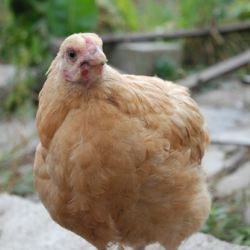
Calvin Trillin tells a story of taking his out-of-town friends and relatives to New York’s China Town to play tic tac toe against a chicken. Frequently, the chicken wins and Trillin reports that the vanquished foes often defend themselves by saying, “But the chicken got to go first” or that “the chicken plays every day.” I love that story, which hides behind a paywall here.
Lori Marino, in Animal Cognition, brings some science to the issue of just how smart that chicken might have been in a meta-analysis of chicken cognitive research. Spoiler alert, if you love fried chicken and knowing that pigs are intelligent interferes with your love of bacon, stop reading now.
“Unlike many other birds, chickens are categorized as a commodity, devoid of authenticity as a real animal with an evolutionary history and phylogenetic context. Thus, arguably, perceptions of chickens shape their use as commodities which, in turn, then reinforces those original perceptions. … Chickens are misperceived as lacking most of the psychological characteristics we recognize in other intelligent animals and are typically thought of as possessing a low level of intelligence compared with other animals.”
Here are Marino’s conclusions
In this paper, I have identified a wide range of scientifically documented examples of complex cognitive, emotional, communicative, and social behavior in domestic chickens which should be the focus of further study. These capacities are, compellingly, similar to what we see in other animals regarded as highly intelligent. They include:
- 1. Chickens possess a number of visual and spatial capacities, arguably dependent upon mental representation, such as some aspects of Stage four object permanence and illusory contours, on a par with other birds and mammals.
- 2. Chickens possess some understanding of numerosity and share some very basic arithmetic capacities with other animals.
- 3. Chickens can demonstrate self-control and self-assessment, and these capacities may indicate self-awareness.
- 4. Chickens communicate in complex ways, including through referential communication, which may depend upon some level of self-awareness and the ability to take the perspective of another animal. This capacity, if present in chickens, would be shared with other highly intelligent and social species, including primates.
- 5. Chickens have the capacity to reason and make logical inferences. For example, chickens are capable of simple forms of transitive inference, a capability that humans develop at approximately the age of seven.
- 6. Chickens perceive time intervals and may be able to anticipate future events.
- 7. Chickens are behaviorally sophisticated, discriminating among individuals, exhibiting Machiavellian-like social interactions, and learning socially in complex ways that are similar to humans.
- 8. Chickens have complex negative and positive emotions, as well as a shared psychology with humans and other ethologically complex animals. They exhibit emotional contagion and some evidence for empathy.
- 9. Chickens have distinct personalities, just like all animals who are cognitively, emotionally, and behaviorally complex individuals.
So maybe Trillin’s friend and relatives were correct, the chicken did have an unfair advantage.
